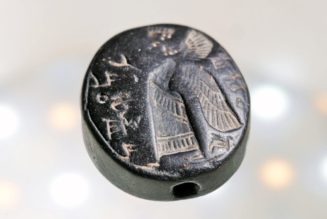
We get three examples of how routine can destroy faith — and what we can do about it — in the readings for Mass Fourteenth Sunday in Ordinary Time, Year B.
I like the way a parable about a lighthouse and an island explain the task of being a missionary to people who should have known better but need to be rescued anyway.
In the Gospel, Jesus has a hard time getting people he knows to take him seriously. That sounds familiar to many of us.
The Sunday Mass readings from the Gospel of Mark are following Jesus’s travels and we hear this Sunday that he “came to his native place, accompanied by his disciples.” He took the opportunity to go to the synagogue on the sabbath to preach his message of repentance and the kingdom of God to his hometown crowd.
The crowd seemed impressed at first. “Where did this man get all this?” they said. “What kind of wisdom has been given him? What mighty deeds are wrought by his hands!”
But then they turn against him. “Is he not the carpenter, the son of Mary, and the brother of James and Joses and Judas and Simon? And are not his sisters here with us?” they ask. “And they took offense at him,” Mark adds.
It is important to note that Mark shares three vital bits of information here.
- First the crowds say, “Is he not the carpenter, the son of Mary?” That reveals that Jesus was himself a working man, not just the son of one.
- Second, their words reveal that Jesus is closely associated with his mother, Mary — perhaps because his father Joseph was dead by this time, or perhaps because, since he only carried Mary’s DNA, he looked more like her.
- Third, the crowd helpfully shares the names of Jesus’s “brothers.” The Church has always considered Mary a virgin with only one son, and has always understood that the use of “brothers” here follows the Semitic custom of calling cousins brothers. In several places Mark identifies these brothers of Jesus as the children of another woman named Mary, a woman Matthew calls “the other Mary” and who John identifies as “Mary, the wife of Clopas.”
But we get our first example of how routine destroys faith when we learn that the crowd “took offense at him.” Jesus uttered the famous words “A prophet is not without honor except in his native place,” and Mark points out that “he was not able to perform any mighty deed there, apart from curing a few sick people by laying his hands on them.”
In the First Reading for Mass we get another example of a prophet who gets no respect from his people.
“As the Lord spoke to me, the spirit entered into me and set me on my feet” is the dramatic way Ezekiel introduces his prophetic calling. He is given a hard job, like Jesus’s in Galilee. God told the Israelite priest, “I am sending you to the Israelites, rebels who have rebelled against me.”
His story reveals a little bit more about why it is hard to evangelize at home: People are deaf to out-of-the-ordinary messages from people who they have exclusively known as part of their everyday life.
“Hard of face and obstinate of heart are they to whom I am sending you,” says the Lord. Ezekiel’s job is to say “Thus says the LORD GOD!” and share a hard message about their future. And the Lord adds, “whether they heed or resist — for they are a rebellious house — they shall know that a prophet has been among them.”
On the one hand, it can be very comforting to know how hard it is for prophets to reach their own people. Maybe we have “found religion” in our own lives while our family hasn’t. And maybe, no matter how hard we try, neither our family nor our friends take our faith seriously. If this is the case, we can rest easy knowing the same was true for the Prophet Ezekiel and for Jesus himself.
On the other hand, these prophets’ examples can be used as a bad excuse for complacent, self-righteous self-pity. We can decide that they exempt us from having to reach out to our family, since they won’t listen anyway. And we can fancy ourselves persecuted prophets and use that as an excuse for never saying a word about the faith.
I humbly submit a third way to think of these examples: Don’t think of them telling you how to feel about your family, but how to feel about your mission. Your family provides a significant obstacle to evangelization. Your mission is to reach out to them anyway.
Don’t make the mistake the seaside villagers made in Ernest Corty’s parable.
Protestant evangelist Ernest Corty tells the story of a lighthouse to explain evangelization.
His parable goes like this: Years ago, on a rocky coastline, a shore town’s inhabitants began noticing that more and more trade ships were passing by — and many were bottoming out on the rocks. So the townspeople decided to build a lighthouse to warn passing ships about the danger.
The lighthouse worked to warn many ships away. But some ships continued to come too close. They would hit the rocks, and their sailors would have to be rescued from the treacherous waters, sometimes in icy conditions. The people enthusiastically began the work of saving sailors — and in order to make the work easier, many built their homes near the beautiful lighthouse.
As time wore on and the people got older, and their houses became better appointed, they began to resent the sailors they had to save: It was hard to go out in the cold, and the sailors were messy and tended to use bad language — and hadn’t each of them failed to heed the lighthouse warning in the first place?
They stopped their rescue missions, figuring that keeping the lighthouse light burning was enough.
In Corty’s story, new “rescuers” had to rise up and make a special commitment to save the sailors.
They built a better-positioned lighthouse and continued the rescues as needed.
Those new “rescuers” are us if we heed Jesus’s Gospel today.
Ezekiel, like Jesus, was dealing with fellow believers who were deaf to his warnings. He had to deliver a warning to a world that has decided not to heed the warnings that are there in the lighthouse of Scripture and Tradition. Ezekiel, like Jesus, knew he couldn’t rely on the synagogues to do the job; he had to.
Nor can we rely on the lighthouses in our day when it comes to those who have stopped heeding them; we have to try something else. And we have to keep at it, whether or not our audience is open to our message or “Hard of face and obstinate of heart.” If they don’t believe us, so be it; they will at least know that a believer has spoken to them.
And that brings us to the third example of the same phenomenon with some important differences: St. Paul.
St. Paul’s problem is related to, but very different from, the examples of prophets who found that familiarity bred contempt. Whereas they had to deal with the lack of success in their message, he has to deal with the success of his. The other two had to worry about their audience taking their message for granted. St. Paul also had to guard against taking his own message for granted.
He describes what the Lord did to prevent him from becoming complacent: “a thorn in the flesh was given to me, an angel of Satan, to beat me, to keep me from being too elated.”
It isn’t clear what this thorn is. It is either a sickness or disability or it is an experience of opposition. At any rate, it is added to the suffering that Paul has to endure even while he does the will of God. He suffers “weaknesses, insults, hardships, persecutions and constraints for the sake of Christ.”
But even when the townspeople shun and block him, he doesn’t stop his preaching or rescuing souls, just like the lighthouse crew.
We need to do the same.
The “Paradoxical Commandments” written by Kent Keith and made famous by Mother Teresa are a great guide for Christians committed to learning this lesson:
“People are illogical, unreasonable, and self-centered. Love them anyway. If you do good, people will accuse you of selfish ulterior motives. Do good anyway,” and, “People really need help but may attack you if you do help them. Help people anyway.”
Do this for people you never met, and even be willing to do this for the people you have known all your life.
Image: Pxhere









